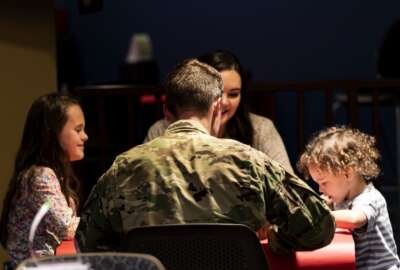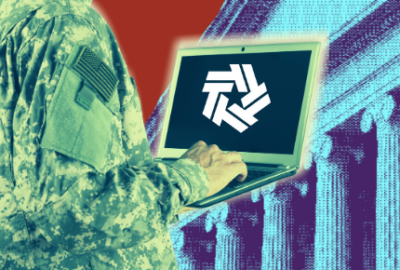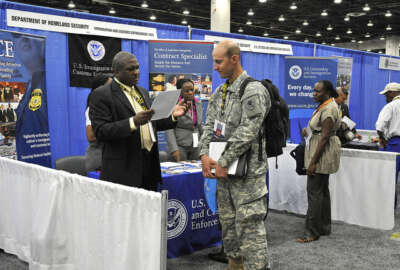One in four DHS employees are veterans. The department wants that number to grow.
Veterans make up roughly one-quarter of the Department of Homeland Security workforce. DHS Deputy Secretary John Tien, a veteran himself, said the department is...
Best listening experience is on Chrome, Firefox or Safari. Subscribe to Federal Drive’s daily audio interviews on Apple Podcasts or PodcastOne.
Veterans make up about one-third of the federal workforce. One of them is a 24-year Army veteran, now Deputy Secretary of the Department of Homeland Security. John Tien told Federal News Network’s Nicole Ogrysko about his own Army experiences, and about the department’s initiatives for recruiting and retaining more former service members on Federal Drive with Tom Temin.
Interview transcript:
John Tien: I served in the United States Army for 24 years from 1987 through 2011. I did three combat tours in Iraq and also was a policy advisor in the Bush and Obama administrations for Iraq, Afghanistan and Pakistan as well. So lots of time with the military and proud to now serve the Department of Homeland Security, where our mission is to with honor and integrity to safeguard the American people, our homeland in our values. [I’m] very aligned to my former motto from the United States Army, this will defend.
Nicole Ogrysko: I think we know that a good portion of the federal workforce are veterans themselves. I think it’s about a third or so. And I believe that’s about the the same for the Department of Homeland Security. So can you just tell us a little bit about what you know of the veteran population within DHS?
John Tien: At the Department of Homeland Security, we’re really proud, and I’m certainly personally proud as a US Army veteran, that over 25% of our DHS workforce, are veterans. And by the way, we are committed to growing that number even more. In fact, we’ve got a DHS veterans recruitment, retention employment strategic plan that guides our work across, I would say three overarching goals. One, recruit and hire diverse veteran workforce. Two, retain veterans through various wellness and resiliency programs. And three, reinforce our commitment to veterans by creating new resources for them. And we do this through a veteran’s resource center, which is similar to other big organizations. But we have an internal one-stop shop that helps address any of our veterans workforce’s most pressing questions from both our new employees, the ones were the ones who were recruiting, and the ones that are onboarded, to make sure that they are transitioning well into the DHS workforce as well. [I’m] super excited about the fact that we’re at 25% of the workforce, and the fact that we’re growing it, and we’ve got a great program to do so.
Nicole Ogrysko: Got it. So just hoping we can go through that plan those three points a little bit more specifically there. Can you tell me about the recruitment efforts that you have specifically geared toward veterans? How are you reaching that population in particular and explaining the homeland security mission to them?
John Tien: So one of the things that we do is, again, as I said before, we advertise to across the different veterans communities that are out there. So these are folks who we’re looking to recruit. The fact that we have this veterans resource center, that is really important, I think, for veterans who are looking and they’re considering whether they’re already in the federal government, or they’re looking to get in the federal government. They want to know that there’s other veterans, that when they join an organization, when they join DHS, that they are going to be amongst folks who know what they’ve been through, that they have a community and that they’re going to get supported. We also have something called the DHS Veterans Employment Council, which provides leadership recommendations and assistance in the development of all of our different departmental veterans related programs. And then you had specifically said, you know, how are we getting out there and doing things and how are we finding folks? We’ve actually established memorandums of understanding with the Department of Veterans Affairs, and the Department of Defense to help servicemembers and veterans who are out there, especially in the VA connected to them, to transition them to civilian positions within the Department of Homeland Security. All of those different things really help get veterans into the door, get them educated about the Department of Homeland Security and our mission. And then if fall goes well, they come on board, and they’re a colleague with me, another veteran to another veteran.
Nicole Ogrysko: What about the retention piece? You mentioned some resources, some resiliency efforts to try to ensure that the folks that you have on board, who are veterans want to stay at the department? Can you tell me a little bit more about that?
John Tien: Well, it’s a number of different things that we try to do. Number one, we want to try to identify that the veteran who’s coming in says that they are veteran, they acknowledge that they’re a veteran, because then that allows us to say, ‘Okay, here’s some of the different things that you can do. You can become part of our Veterans Resource Center, you can join our Veterans Employment Council.’ I just spoke to all of our veterans who happen to serve in FEMA. And when they understand that there’s these organizations that are essentially an internal community, they join there. And then it’s sort of reinforcing to that. And I think that just helps them consider and understand that there is a place that I can go as a veteran if I need some help in terms of just being a veteran and particularly about being a veteran in the federal workforce, and in particular, about even more so a veteran here at the Department of Homeland Security. We really see that being a part of the strong retention efforts that we have here.
Nicole Ogrysko: And to expand the question just a bit broader, to just broader DHS employee engagement efforts, I know this has long been a priority for the department. In fact, a couple years ago, we spoke to one of the predecessors for your job, now your boss, Secretary Mayorkas, about his interests in this area. Can you speak about just broader engagement efforts that you have going on, to include veteran employees but maybe even beyond that?
John Tien: Secretary Ali Mayorkas and myself, we’re great partners in the focus on veterans. We just participated in a really fun event here, where we honored this week the Marine Corps’ 246th birthday. That’s always on Nov. 10. That’s the Marine Corps’ birthday. The secretary spoke very eloquently about his respect for the Marines, in particular about his respect for military service, and really honored all of us veterans here at the Department of Homeland Security. Now, one of the things that Secretary Mayorkas did prior to becoming the deputy, he was also the head of U.S. Citizenship and Immigration Service. And he recommended to me he said, ‘John, one of the first things that I think he should try to do is get out there and do naturalization ceremony with either active-duty or veterans.’ And I did that on Monday in New York City, where out of the 80 folks that we brought in as new U.S. citizens, 22 of them were serving in the U.S. Army, Marines or the Air Force. What an honor it was to stay in there, raise the right hand, read them their oath and bring them in as fellow U.S. citizens, 22 of them all of them in uniform.
Nicole Ogrysko: To go back to perhaps the recruitment side of things, it’s a pretty competitive labor market out there. You’re competing for talent, veterans, potentially, to join the department. Just wondering how you explain the public service mission that you have at the department and really advertise that in a way that might resonate with them?
John Tien: One of the things that align really well here at the Department of Homeland Security is our broad mission. Our broad mission here is with honor and integrity, we will safeguard the American people, our homeland and our values. And that aligns very well, I think, on a philosophical level, and in terms of action and execution, to the missions of all of the military services. And again, remember here in the Department of Homeland Security, we have resident within our department, one of the branches of the military, the United States Coast Guard. Think about the mission I just said about, and then think about the Coast Guard’s motto, Semper Paratus, always ready. So I think those connections really resonate well with veterans, and it’s why we’ve got 25% of our employees [who] are veterans from across all those services to include veterans of the Coast Guard as well.
Copyright © 2025 Federal News Network. All rights reserved. This website is not intended for users located within the European Economic Area.
Nicole Ogrysko is a reporter for Federal News Network focusing on the federal workforce and federal pay and benefits.
Follow @nogryskoWFED






